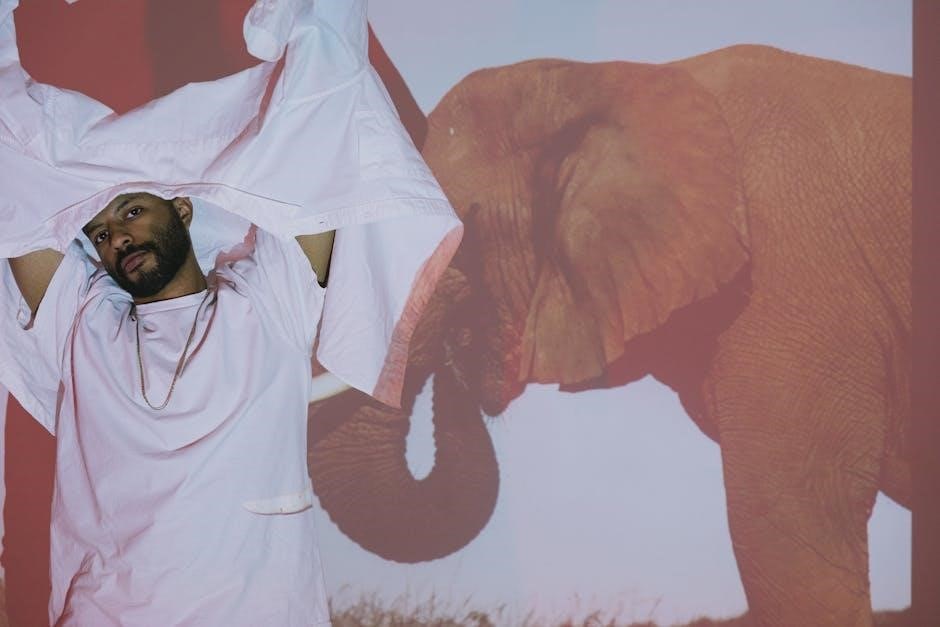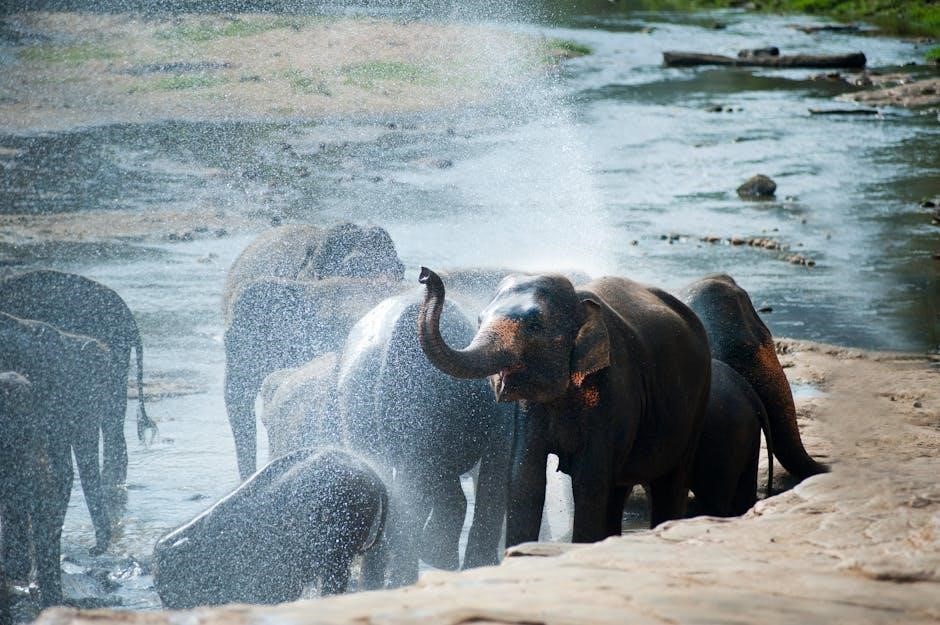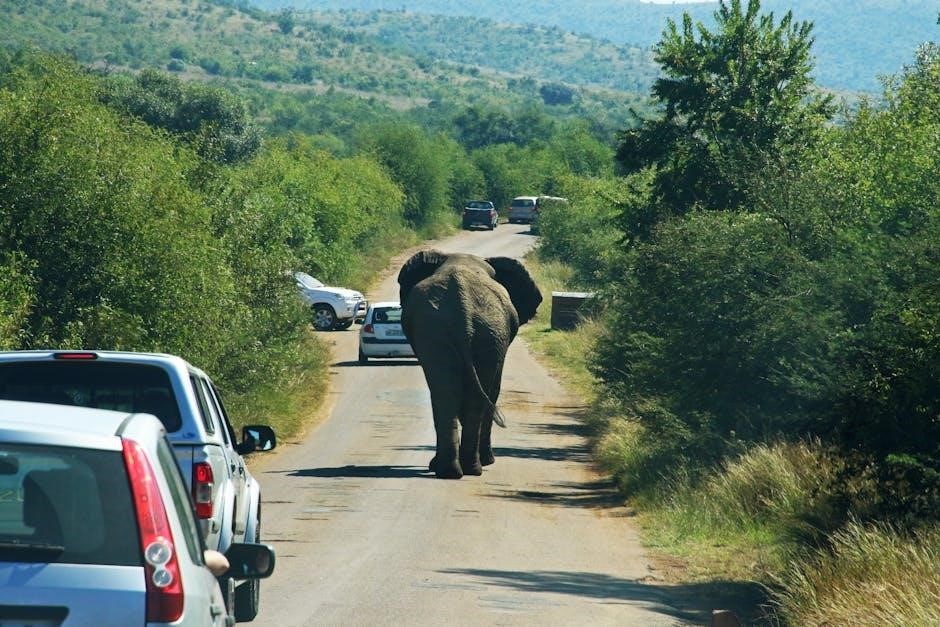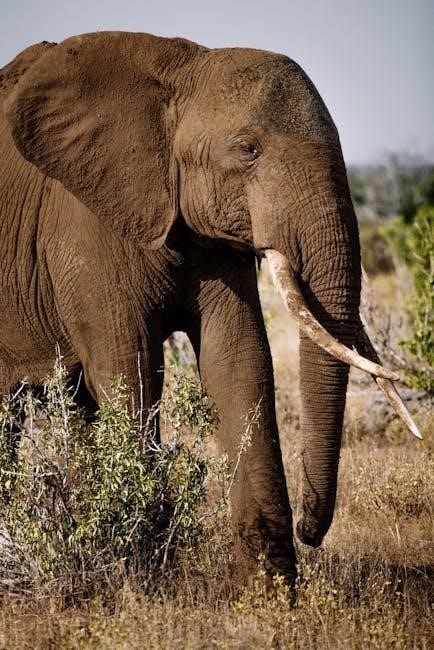George Orwell’s autobiographical essay reflects his experiences as a police officer in Burma, recounting the shooting of an elephant as a symbolic critique of imperialism and moral conflict, featured in his collected works.
1.1 Background of the Essay
George Orwell’s essay “Shooting an Elephant” was first published in 1936, drawing from his experiences as a British police officer in Burma during the 1920s. The essay is autobiographical, reflecting Orwell’s deep-seated critique of colonialism and its moral complexities. Set in Moulmein, Burma, the narrative explores the tension between personal morality and societal expectations. Orwell’s account of killing an elephant, driven by the pressure of a watching crowd, serves as a metaphor for the destructive nature of imperialism. The essay is celebrated for its vivid storytelling and its exploration of power dynamics, making it a cornerstone of Orwell’s literary legacy.
1.2 George Orwell’s Role as a Police Officer in Burma
George Orwell served as a police officer in British-ruled Burma during the 1920s, an experience that deeply shaped his views on colonialism. As a young officer, he was resented by the local population, who viewed him as a symbol of oppressive British authority. His role often placed him in morally challenging situations, where he was forced to enforce policies he personally opposed. The hostility he faced, including public mockery and resistance, fueled his growing critique of imperialism. These experiences later became the foundation for his essay, offering a personal lens through which to examine the complexities of colonial power and its impact on both rulers and the ruled.
Themes of the Essay
The essay explores themes of colonialism, moral conflict, and the corrupting influence of power, highlighting the tension between personal conscience and societal expectations in oppressive systems.
2.1 Colonialism and Its Impact
Orwell’s essay vividly portrays the oppressive nature of colonialism, highlighting the dehumanizing effects on both the colonizers and the colonized. The narrator’s role as a police officer in Burma symbolizes the oppressive machinery of British colonial rule. The essay critiques how colonialism fosters resentment and violence, as seen in the hatred directed toward the narrator. The shooting of the elephant itself serves as a metaphor for the senseless destruction caused by colonial authority. Orwell’s personal struggle with the moral implications of his actions reflects the broader ethical decay of colonial systems. The essay underscores the lasting scars of colonialism on individuals and societies, offering a powerful indictment of imperialism’s legacy.
2.2 The Dilemma of Power and Authority
The essay explores the tension between personal morality and the oppressive weight of authority; Orwell, as a British police officer in Burma, feels trapped by the expectations of colonial rule. The crowd’s pressure to shoot the elephant symbolizes the suffocating nature of authority, where fear of appearing weak dictates actions. Orwell’s internal conflict—desiring to spare the elephant but compelled to act—highlights the corrupting influence of power. The narrative reveals how authority often prioritizes appearances over ethics, leading to morally questionable decisions. This dilemma underscores the psychological toll of wielding power in a colonial context, where individual will is overshadowed by systemic demands.

2.3 Moral Conflict and Personal Struggle
Orwell’s essay delves into the deep moral conflict he faced as a colonial officer. Torn between his personal conviction to spare the elephant and the external pressure to conform to colonial expectations, he struggles with guilt and self-doubt. The act of shooting the elephant, despite his reluctance, symbolizes the triumph of societal expectations over individual morality. This internal strife reflects the broader ethical challenges of imperialism, where personal values are often sacrificed to maintain authority. Orwell’s narrative becomes a poignant reflection of the human cost of colonialism and the moral ambiguity it engenders in those who enforce it.
Symbolism in “Shooting an Elephant”
Orwell uses symbolism to explore themes of colonialism and moral conflict; The elephant represents oppressive colonial power, while the crowd symbolizes societal pressure and expectations. The rifle embodies authority and control, highlighting the tension between personal morality and institutional duty.
3.1 The Elephant as a Symbol of Oppression
The elephant in Orwell’s essay symbolizes the oppressive nature of colonial rule. Its uncontrolled rampage mirrors the destructive impact of British imperialism on Burmese society. The animal, once tame but now wild, represents the chaos caused by colonial interference. Orwell’s reluctance to shoot it reflects the moral ambiguity of enforcing oppressive authority. The elephant’s eventual destruction serves as a critique of the colonial system’s inherent violence and the empty triumph of power over nature and humanity. This symbolism underscores Orwell’s condemnation of imperialism and its dehumanizing effects on both the oppressors and the oppressed.
3.2 The Crowd and Its Influence on Decision-Making

The crowd in Orwell’s essay plays a pivotal role in shaping the narrator’s actions, highlighting the power of societal pressure. The narrator, eager to avoid appearing weak, feels compelled to shoot the elephant to maintain his authority in the eyes of the onlookers. The crowd’s presence amplifies the narrator’s internal conflict, as he prioritizes their expectations over his own moral judgment. This dynamic illustrates how collective opinion can dictate individual decisions, even when they contradict personal beliefs. The crowd’s influence underscores the theme of conformity and the burdens of authority in a colonial context.
3.3 The Rifle as a Tool of Power
The rifle in Orwell’s essay symbolizes the narrator’s authority and the burden of power. Carrying it, he feels a sense of responsibility and fear, as the crowd expects him to act decisively. The rifle becomes a physical manifestation of colonial power, yet it also highlights the narrator’s internal conflict. Orwell’s hesitation to use the rifle reflects his moral struggle, as he is torn between maintaining his image as an enforcer of order and sparing the elephant’s life. The rifle thus embodies both the power of authority and the weight of its consequences, central to the essay’s exploration of imperialism and personal ethics.

Historical Context
Set during British colonial rule in Burma, Orwell’s essay reflects his experiences as a police officer in the 1920s, offering a critique of imperialism and its impact on both rulers and the ruled.
4.1 British Colonial Rule in Burma
During the 1920s, British colonial rule in Burma created a tense environment of oppression and resistance. The British Empire’s dominance imposed strict control over local populations, fostering resentment among the Burmese. Orwell, as a police officer, witnessed firsthand the complexities of colonial power dynamics. The British were seen as enforcers of an oppressive system, while the Burmese often resented their presence. This period of colonial rule shaped Orwell’s critical perspective on imperialism, influencing his writing and moral reflections in “Shooting an Elephant.” The essay captures the societal tensions and personal struggles inherent to colonial governance.
4.2 The Role of the Police in Colonial Society
In colonial Burma, the police served as enforcers of British authority, maintaining control over the local population. Their role was dual: to uphold order and to suppress dissent. Orwell, as a police officer, experienced the tension between his duty to enforce colonial rule and the resentment it provoked. The police were often seen as symbols of oppression, embodying the power imbalance between the British and the Burmese. This dynamic created a complex moral landscape, where authority was both exerted and challenged. Orwell’s essay highlights the internal conflict of serving as a representative of a system he increasingly questioned.
George Orwell’s Prose Style
Orwell’s prose in “Shooting an Elephant” is autobiographical, blending vivid storytelling with philosophical reflection. His use of first-person narrative creates intimacy, while his satirical tone critiques colonialism and personal morality, offering a timeless commentary on power and ethics.
5.1 Use of First-Person Narrative

Orwell employs a first-person narrative in “Shooting an Elephant,” creating a deeply personal and introspective tone. This narrative style immerses readers in the protagonist’s moral and emotional struggles, fostering empathy and immediacy. By recounting his experiences directly, Orwell conveys the complexities of colonial life and his internal conflict with imperialism. The first-person perspective allows Orwell to express his feelings of helplessness, anger, and regret, making the essay a powerful exploration of personal conscience and societal pressures. This narrative choice enhances the essay’s emotional impact and authenticity, drawing readers into Orwell’s conflicted world as a colonial officer in Burma.
5.2 Satirical and Reflective Tone
Orwell’s essay “Shooting an Elephant” is infused with a satirical and reflective tone, critiquing British colonialism and the moral dilemmas it imposed. The narrative uses satire to expose the absurdity of colonial authority and the pressure to conform to societal expectations. Orwell’s reflective voice highlights his personal struggle with imperialism, revealing the emotional and ethical conflicts he faced as a colonial officer. This tone not only critiques the system but also invites readers to reflect on the broader implications of power and morality. The essay’s satirical undertones enhance its critique of colonialism, making it a compelling commentary on human nature and authority.

The Moral Dilemma
Orwell’s essay explores the moral conflict of shooting an elephant, highlighting the tension between personal conscience and societal expectations, revealing the ethical struggles of colonial authority.

6.1 The Decision to Shoot the Elephant
Orwell reluctantly decides to shoot the elephant, driven by the pressure of the crowd and the symbolic need to maintain British authority. Despite his internal conflict and moral reservations, he prioritizes appearances over ethics, illustrating the destructive influence of colonial expectations and the loss of personal autonomy. The act becomes a poignant critique of imperialism, where fear of judgment overrides compassion and reason.
6.2 The Consequences of the Action
The shooting of the elephant leads to profound consequences, both literal and symbolic. The elephant’s prolonged death highlights the brutality of the act, while Orwell grapples with guilt and regret. The villagers, though initially demanding action, show mixed reactions, revealing the complexities of colonial dynamics. Orwell reflects on the futility of his decision, realizing it was driven by appearances rather than necessity. This event profoundly shapes his critique of imperialism, illustrating the moral decay and loss of personal autonomy under colonial rule.

Critical Analysis
Scholars acclaim Orwell’s essay for its profound critique of colonialism and exploration of moral conflict, highlighting its enduring relevance in understanding power dynamics and human conscience today.
7.1 The Essay’s Relevance Today
Orwell’s “Shooting an Elephant” remains a powerful commentary on colonialism, authority, and moral ambiguity. Its exploration of how power corrupts and the pressure to conform resonates deeply in modern discussions on imperialism, systemic oppression, and personal ethics. The essay’s themes of psychological conflict and the dangers of unchecked authority continue to offer insights into contemporary issues, making it a timeless critique of human behavior and societal structures. Its relevance endures as a cautionary tale about the consequences of blindly following power and the loss of moral autonomy in the face of expectations.
7.2 The Impact on Orwell’s Later Work
Orwell’s experience in Burma, as detailed in “Shooting an Elephant,” profoundly influenced his later writing. The essay’s themes of power, morality, and the dangers of authoritarianism laid the groundwork for his iconic novels, such as Animal Farm and 1984. The reflective, first-person narrative style he honed in this essay became a hallmark of his prose, allowing him to explore complex societal issues with clarity and depth. The moral and political insights gained from his colonial service shaped his critique of totalitarianism, making “Shooting an Elephant” a pivotal piece in his literary evolution and thematic development.

George Orwell’s “Shooting an Elephant” remains a profound reflection on colonialism, power, and moral ambiguity. Through the narrator’s reluctant decision to shoot the elephant, Orwell critiques the oppressive nature of imperialism and the loss of personal autonomy under authoritarian systems. The essay’s vivid narrative and symbolic depth continue to resonate, offering timeless insights into human nature and societal control; Its exploration of ethical dilemmas and the consequences of conformity underscores Orwell’s enduring relevance as a literary and political thinker, solidifying the essay’s place as a cornerstone of 20th-century literature.
